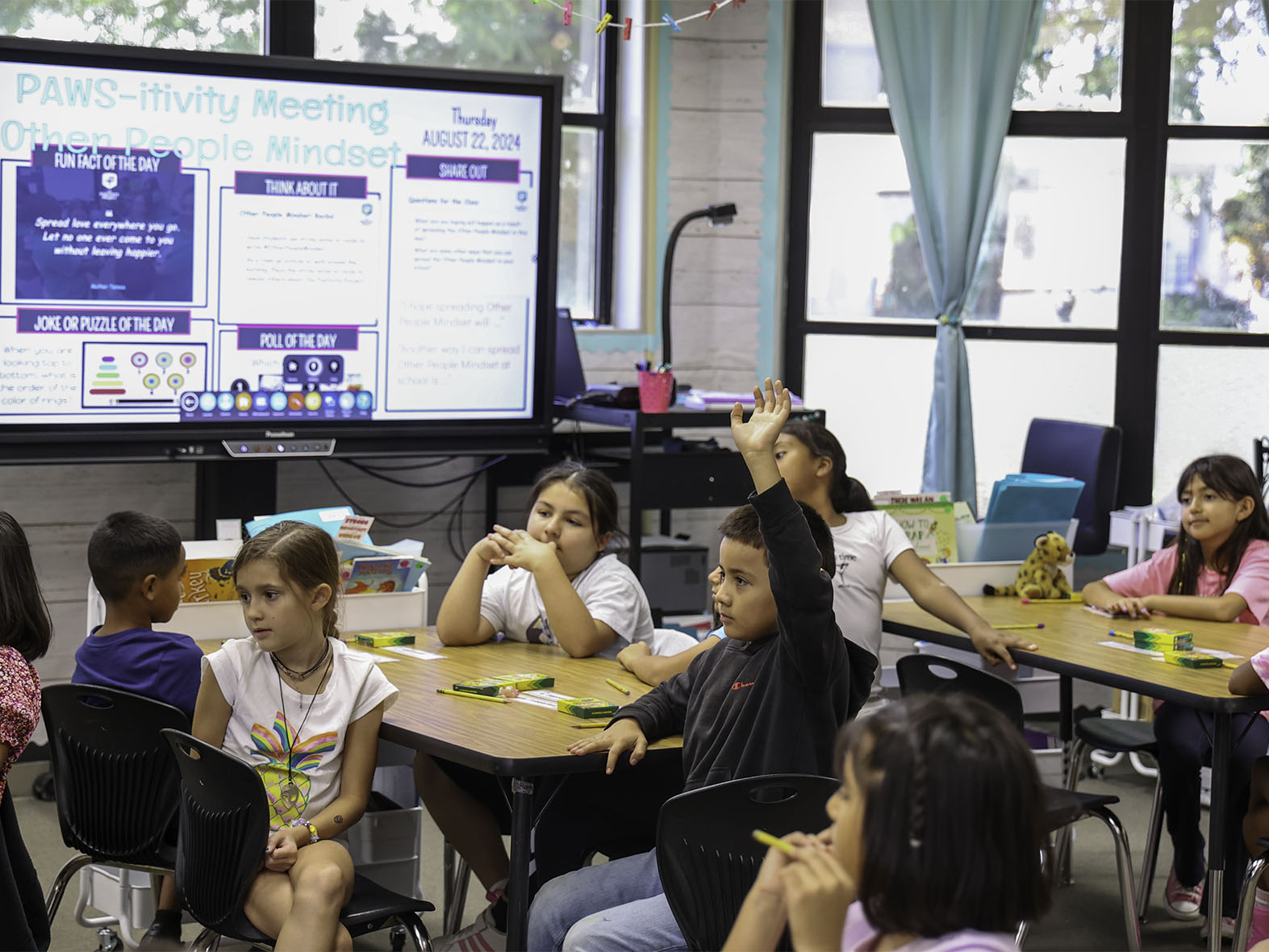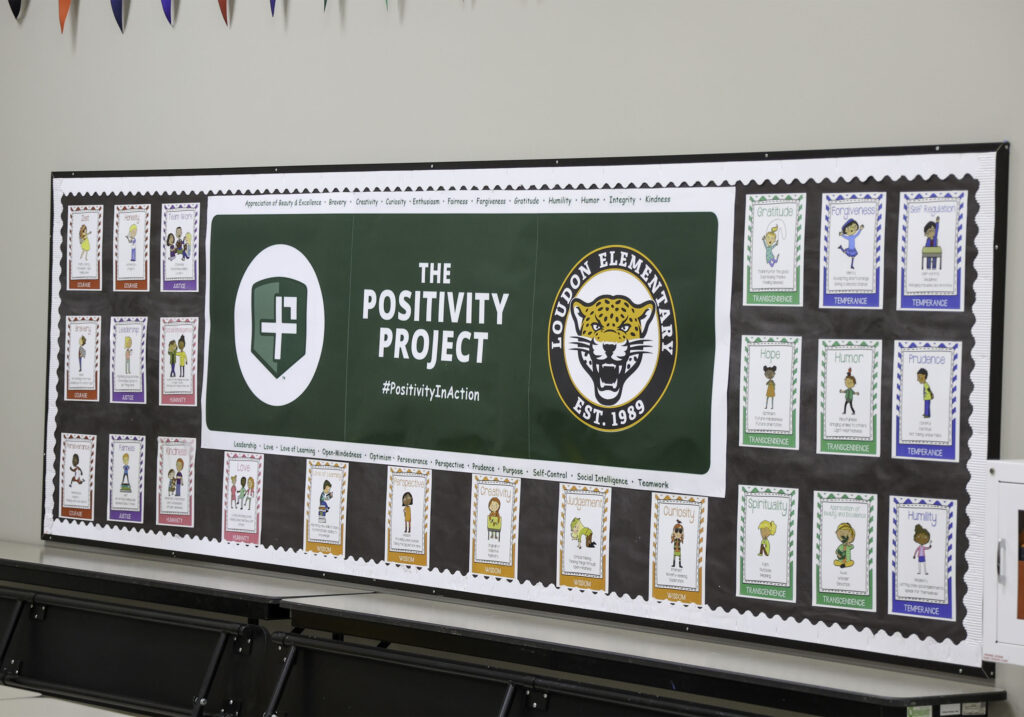
Panama Buena-Vista Embraces Social-Emotional Learning with The Positivity Project
Tuesday August 27, 2024
In recent years, Kern County schools have increasingly recognized the need for Social-Emotional Learning (SEL) in their classrooms. With the emotional and psychological challenges brought on by the COVID-19 pandemic and other stressors, educators have been trying to find ways to better support their students’ mental health. The Positivity Project, also known as P2, has been embraced by the Panama Buena-Vista Union School District (PBVUSD) as one way to fulfill this need.
“[The pandemic] was a traumatic experience that we all shared,” says Dr. Jazmine Frias, director of student support services at PBVUSD. “Social, emotional learning is instilling some really great human values and supporting families so they’re not feeling like they’re alone.”
PBVUSD decided to try out The Positivity Project at 21 schools this year, inspired by the curriculum’s success in other Kern County schools and nationwide. Dr. Frias says that by introducing P2 as one form of SEL, teachers can explore the curriculum and its impact, with the hope of implementing a universal program district-wide next year.
“Our charge to educators this year is to just dip their toes in the SEL water,” explained Dr. Frias. “Give it a try, see what you think and then give us some feedback.”

The Positivity Project focuses on teaching students about 24 different character strengths such as bravery, curiosity, and kindness, as well as fostering the Other People Mindset. The curriculum teaches kids K-12 how one’s actions and words affect others, creating a sense of empathy, and building positive relationships. Lessons are designed differently for each grade level, including discussions, activities, videos, and more.
For example, if the week’s lesson is bravery, the curriculum provides examples of courageous individuals throughout history and discussion prompts on what it means to be brave. The curriculum also emphasizes other character strengths like empathy, integrity, and perseverance, encouraging all students to think about and support each other.
First-grade teacher Morgan Patrick at Loudon Elementary School says the lessons help build relationships between students, teachers, and the community.
“You’re nurturing and building good character strengths that are in all of us, but now we’re opening them up and we’re calling them out by name,” Patrick said. “It really does empower them to feel confident in who they are, even at such a young age.”
Loudon is one of the early adopters of The Positivity Project at the district. Four years ago, Principal Jared Coppolo and other administrators visited Discovery Elementary in the Fruitvale School District to see how the curriculum worked and decided to adopt it. The school implemented a 20-minute block each morning, which included greeting and checking in with each student and conducting the P2 lessons.
“Children are very inward, thinking about themselves naturally,” Patrick explained. “Now it has changed to where they’re looking out, noticing when people are hurting. It’s great self-awareness, but also an awareness of others.”

Students engage in activity about kindness.
Patrick has embraced the program wholeheartedly, becoming the program facilitator for P2 at Loudon. She says the lessons are user-friendly, with everything provided online, allowing teachers to implement the lessons with little to no additional prep work.
“The program is really great. They provide everything you need,” she said. “That was what sold a lot of people. They were able to jump in and do it with fidelity quickly.”
The program has already had a profound impact. Since implementing P2, Loudon Elementary has seen a significant decrease in suspension rates, from 3.4 percent to 1.2 percent, a reduction of behavioral problems, and an overall improvement in school culture.
“Our students are more engaged, more supportive of each other, and more mindful of their actions,” says Coppolo.
Dr. Frias agreed, saying the benefits are huge, not only for students’ academic success, but the overall well-being of the community.
“More kids are coming to school, more kids are staying in class, and there are better relationships between teachers, students, and families all the way around,” she said. “It’s been a wonderful resource and a small investment for a large yield in terms of outcome.”

Loudon has also achieved Green Shield status from The Positivity Project two years in a row, a recognition given to only a handful of schools worldwide.
Parents are invited to participate through “P2 for Families,” which includes resources in both English and Spanish to continue SEL discussions at home. Caregivers can use the online resources to engage with their students.
“It creates that conversation,” Patrick explained. “They can get on their phone or their laptop, listen to a story and talk about it around the dinner table.”
Beyond improving student behavior and school culture, the program has had a broader impact on the community. Loudon created an annual school-wide community service project. Each class chooses an initiative such as helping people experiencing homelessness, organizing a sock drive, or writing letters to retirement homes and military service members. Classes work together to design a bulletin board demonstrating how their project embodies the Other People Mindset. Then, the community is invited for a family night to see the culmination of the students’ hard work.
“The line of students coming through to see what everybody did, it’s actually very powerful to see the amount of community work that they’re doing,” Coppolo said.


Classrooms incorporate P2 lessons into curriculum throughout the day.
The journey with The Positivity Project is personal for many educators involved. Dr. Frias shared her own experience growing up in a challenging household and how school became a safe haven for her. She says many students are going through similar struggles, especially post pandemic, and providing proactive support through SEL is crucial.
“There’s a sense of urgency for me as an educational leader because I know I’m not the only one,” she says. “Providing proactive social emotional learning is a way to help folks who aren’t ready to ask for help, because it’s the right thing to do.”
Coppolo says P2 has been a great program that’s easy to use and produces great results, but it takes commitment from everyone working together consistently each day to find success.
“Every teacher has to do it, and you’ve got to do it every day,” he said. “Fifteen to twenty minutes a day is not that much, especially when you’re talking about how it’s influencing kids. It’s worth it, but it has to be done with fidelity.”
As the district looks ahead, it is committed to expanding The Positivity Project and other SEL initiatives. Dr. Frias and Coppolo invite leaders from other districts to come tour the schools to see P2 in action and give it a try for themselves.
“Our doors are open,” Dr. Frias said. “We welcome conversations with other Kern County educators to talk more about what this can look like because we’ve seen nothing but great success and great feedback from our educational partners.”
The Positivity Project is a movement toward healing, empathy, and community-building in education. Its goal is to create environments where every student feels safe, valued, confident, and ready to succeed in the classroom.
“They make it very easy to cultivate that affirming, healing, learning environment that so many that our families are asking for and our students need,” Dr. Frias said.

By Katie Avery
Katie Avery joined the Kern County Superintendent of Schools in 2023 as a Communications Specialist. As a former journalist and marketing professional, her passions include media and storytelling. Before joining KCSOS, Avery worked for various local TV stations as well as the health care industry.
